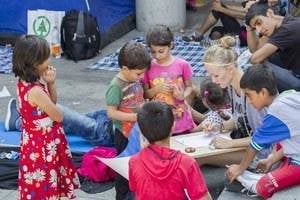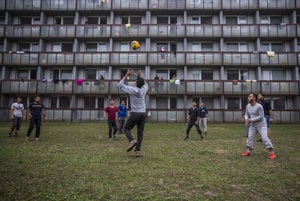Initiative operates under the Ladislav Hanus Fellowship, a Christian group. Some 2,000 volunteers are part of their efforts and 160 are willing to provide living space for migrants with another 380 willing to chip in financially. Nearly 850 people said they could help refugees to learn Slovak and a similar number is ready to help them find a job, according to survey published on November 8.
 Slovaks uniting to help migrants Read more
Slovaks uniting to help migrants Read more “The number of volunteers shows that civil society is much more confident than the government when it comes to accepting refugees,” Martin Dubéci of Plea for Humanity, an initiative supporting NGOs which are helping refugees, told The Slovak Spectator.
No more refugees
Based on a decision of the European Union’s interior ministers on September 22, Slovakia should accept 802 refugees in total – 190 from Italy and 612 from Greece in the first stage of an EU-wide relocation plan. However, the government has said it plans to relocate only 60 people from Italy and 40 people from Greece. Additionally, it will take 100 migrants, Syrian refugees, from Lebanon, Jordan and Iraq in the next two years.
 Slovakia ignores EU rules on refugees Read more
Slovakia ignores EU rules on refugees Read more “Theoretically we could care for about all those refugees from the beginning of 2016,” Kto pomôže Project Coordinator Michaela Pobudová told The Slovak Spectator.
The results of the survey mean the country’s capacity for integrating refugees is greater than many have realised.
When considering the fact that there are other integration focused NGOs, Slovakia could take many more than 200, according to Dubéci.
The state is outsourcing refugee integration programmes to NGOs. Currently its main partner is Caritas Slovakia (SKCH) which also cooperates with volunteers. It has three offices around Slovakia. In 2014 its Bratislava office was dealing with 200 refugees going through the integration process and this year its offices deal with 80 refugees per month, said Jana Verdura of SKCH.
The Interior Ministry which covers refugees issues, however does not plan to increase the number of refugees which the country voluntarily wants to accept.
“The Slovak commitments are not changing and are still valid,” ministry spokeswoman Marta Fabianová told The Slovak Spectator.
System of work
Caritas Slovakia cooperates with the migration office at the Interior Ministry. Caritas has the main responsibility for integration of refugees therefore it cannot completely leave its clients to a new organisation with inexperienced volunteers, according to Verdura.
“Volunteers should be at disposal to refugees 24 hours per day which is very demanding for an inexperienced person,” Verdura told the Slovak Spectator.
The Slovak Spectator asked the Interior Ministry whether it is legal for volunteers to provide shelter to refugees and how the cooperation between the ministry and the initiative will look like. The ministry responded it has received offers from several firms and persons offering shelter for refugees and that it is planning to use them.
“We are in touch with those people or organisations of volunteers,” Fabianová said. “After refugees come we will accept some of those offers.”
Turning professional
The initiative Kto pomôže should turn into regular professional organisation at the beginning of 2016. Currently it is seeking financial backers. At the same time it is building a system of training, supervising and support to prevent burnout.
“We want our volunteers to know that we are praising their work and we are here for them,” Pobudová said.
Currently there is no united training system for volunteers willing to work with refugees. Kto pomôže is preparing the one and is consulting it with Bratislava Volunteer Centre (BDC). The centre is now seeking advice abroad.
“We are discovering how this works abroad and we want to learn from others,” BDC head Alžbeta Frimmerová told The Slovak Spectator.
The initiative’s plan is to form 20-member groups of volunteers who will help four refugees. Those groups should meet once a month to share experience and provide support to each other. Each group should have one coordinator to supervise and connect the group with higher management.
“We want to create a community of people who have a common desire to help others,” Pobudová said.
Volunteers of Kto pomôže should not only provide shelter and help with practical needs of refugees but also try to arrange meetings between them and Slovaks to help integrate them.
The great advantage of such work with refugees is that they will be distributed among Slovak families not to separated hostels. It means that here is a significantly decreased risk that refugees will create segregated ghettos and high probability that they will be successfully integrated into society, according to Dubéci.
“The government should get on its knees and thank those volunteers because in this way there is only a small chance that refugees will create problems here,” Dubéci said.
Preventing burnout
Organisers plan to meet the first volunteers in the end of 2015 to discuss which form of help they are ready to provide. Those meetings should also work as a filter for people unfit for such work.
Many people who want to help others are not aware of how demanding the job is. When it comes to most demanding volunteering just one-fourth of all applicants are usually able to meet requirements, according to Frimmerová.
However, SKCH also uses volunteers and it has not refused many applicants so far. Usually it is because they have signs of psychical instability, difficult personality or they imagined the volunteering differently, according to Radovan Gumulák, general secretary of the SKCH.
He agrees that education, supervision and meetings with volunteers are the best ways to prevent burnout.
“To keep volunteers it is really important for them to feel that they are needed and their help is useful,” Gumulák told The Slovak Spectator.
Education materials
Currently Kto pomôže cooperates also with mediation organisations to create informational materials about cultural differences between refugees and the majority population in Slovakia.
When it comes to dealing with Muslim refugees Mohamad Safwan Hasna, head of the Islamic Foundation in Slovakia, usually sees two mistakes. First, there are people who want to help refugees but completely forget that those people came from a different society.
“They are treating them in the same way as they would treat any Slovak, which can sometimes lead to awkward situations or mutual misunderstandings,” Hasna told The Slovak Spectator.
On the other hand, there are volunteers who are too cautious. The interaction then seems to be forced and migrants can feel that volunteers are keeping their distance.
“If volunteer is not sure whether something is appropriate or not he or she should simply ask,” Hasna said. “It’s always better than being quiet and causing an unnecessary misunderstanding.”






